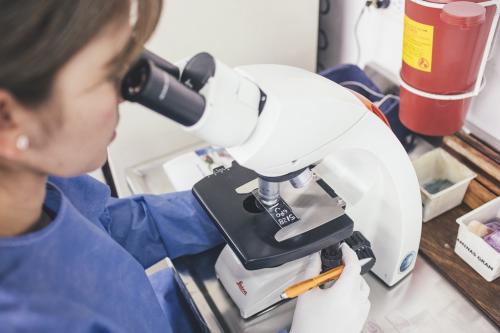Not enough new antibiotics in the pipeline, UN report warns
Too few new antibiotics are under development to combat the growing threat of antimicrobial resistance, a United Nations report has found.

Laboratory worker testing antibiotics on a resistant infection.
The report released on Sep 20 by the World Health Organization (WHO) says most of the drugs currently in the clinical pipeline are modifications of existing classes of antibiotics and are only short-term solutions.
“Antimicrobial resistance is a global health emergency that will seriously jeopardize progress in modern medicine,” said WHO Director-General Tedros Adhanom in a press release.
The report found very few potential treatment options for those antibiotic-resistant infections identified by WHO as posing the greatest threat to health, including drug-resistant tuberculosis which kills around 250,000 people each year.
"There is an urgent need for more investment in research and development for antibiotic-resistant infections including TB, otherwise we will be forced back to a time when people feared common infections and risked their lives from minor surgery," Mr. Adhanom said.
In addition to multidrug-resistant tuberculosis, WHO has identified 12 classes of priority pathogens – some of them causing common infections such as pneumonia or urinary tract infections – that are increasingly resistant to existing antibiotics and urgently in need of new treatments.
The report identifies 51 new antibiotics and biologicals in clinical development to treat priority antibiotic-resistant pathogens, as well as tuberculosis and the sometimes deadly diarrhoeal infection Clostridium difficile.
Among all these candidate medicines, however, only eight are classed by WHO as innovative treatments that will add value to the current antibiotic treatment arsenal.
There is a serious lack of treatment options for multidrug- and extensively drug-resistant M. tuberculosis and gram-negative pathogens, including Acinetobacter and Enterobacteriaceae (such as Klebsiella and E.coli) which can cause severe and often deadly infections that pose a particular threat in hospitals and nursing homes.
The report also found that although oral antibiotics are essential for treatment outside hospitals or in resource-limited settings, few are in the pipeline.
“Pharmaceutical companies and researchers must urgently focus on new antibiotics against certain types of extremely serious infections that can kill patients in a matter of days because we have no line of defence," said Suzanne Hill, Director of the Department of Essential Medicines at WHO.
To counter this threat, WHO and the Drugs for Neglected Diseases Initiative (DNDi) set up a research and development partnership.
According to Mario Raviglione, Director of the WHO Global Tuberculosis Programme, research for tuberculosis is seriously underfunded, with only two new antibiotics for treatment of drug-resistant tuberculosis having reached the market in over 70 years.
“If we are to end tuberculosis, more than $800 million per year is urgently needed to fund research for new anti-tuberculosis medicines,” he said.
Source:United Nations
- 279 reads
Human Rights
Ringing FOWPAL’s Peace Bell for the World:Nobel Peace Prize Laureates’ Visions and Actions

Protecting the World’s Cultural Diversity for a Sustainable Future

The Peace Bell Resonates at the 27th Eurasian Economic Summit

Declaration of World Day of the Power of Hope Endorsed by People in 158 Nations

Puppet Show I International Friendship Day 2020

